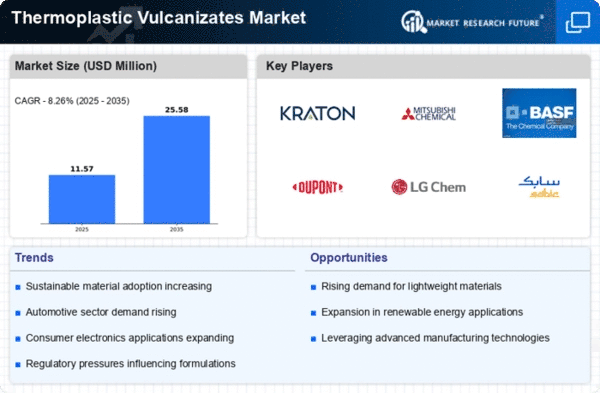Top Industry Leaders in the Thermoplastic Vulcanizates Market

Thermoplastic vulcanizates (TPVs), a fascinating marriage of rubber and thermoplastics, are rewriting the material science narrative. These hybrid materials seamlessly blend the elasticity and durability of rubber with the processability and recyclability of thermoplastics, unlocking a treasure trove of possibilities.Navigating this dynamic landscape, however, requires a strategic toolbox and an insatiable curiosity for innovation.
Key Strategies Shaping the Market:
-
Product Diversification: Leading players like Dow Chemical, ExxonMobil, and Kraiburg TPE are constantly expanding their TPV portfolios, introducing formulations tailored to specific end-use requirements. This differentiation caters to niche markets and fosters customer loyalty. -
Vertical Integration: Securing control over critical raw materials like elastomers and thermoplastic resins is crucial for ensuring stable supply chains and cost competitiveness. Companies like Lanxess are actively pursuing vertical integration, gaining control over key resources. -
Technological Advancements: Continuous research and development in novel TPV formulations, processing techniques, and sustainable feedstock options are vital for sustained growth. BASF's recent breakthrough in using bio-based elastomers in TPVs exemplifies this commitment to innovative solutions. -
Geographic Expansion: Emerging economies like China and India present immense potential for TPV consumption. Companies like Jilin Chemical Industry Group Co., Ltd. are strategically building production facilities in these regions to capitalize on the growing demand. -
Sustainability Focus: Environmental concerns surrounding traditional rubber production and the end-of-life management of TPVs are pushing manufacturers towards eco-friendly alternatives. Sumitomo Chemical's focus on developing readily recyclable TPV grades demonstrates this commitment to responsible practices.
Factors Dictating Market Share:
-
Brand Reputation and Reliability: Established players with proven track records like DSM and Asahi Kasei enjoy significant market share due to their brand recognition and consistent quality. However, innovative startups addressing specific applications can still carve out their space. -
Cost Competitiveness: Optimizing production processes and sourcing affordable raw materials are crucial for cost leadership. Asian manufacturers often have an edge due to lower labor costs, but premium brands command higher prices due to superior performance and environmental credentials. -
Distribution Network and Customer Service: Extensive distribution networks and prompt technical support are essential for customer satisfaction and repeat business. Companies like TPC Group excel in this area. -
Regulatory Landscape: Stringent environmental regulations, especially in Europe and North America, are pushing manufacturers towards bio-based and readily recyclable TPV options. Adapting to evolving regulations and developing compliant products becomes crucial for market success.
Key Players:
Arkema (France), Asahi Kasei Corporation (Japan), BASF SE(Germany), BAYER AG(Germany), The Dow Chemical Company( U.S.), Dow Corning Corporation(U.S.), Eni S.p.A.( Italy), Exxon Mobil Corporation( U.S.), Mitsubishi Chemical Holdings Corporation ( Japan), among others.
Industry News and Recent Developments:
August 2023: ExxonMobil partners with a leading automotive manufacturer to develop high-performance TPVs for automotive interior components, replacing traditional PVC, contributing to lighter vehicles and fuel efficiency.
September 2023: The Chinese government announces plans to invest in building earthquake-resistant infrastructure using TPVs due to their superior vibration dampening properties.
November 2023: Dow Chemical unveils a new line of bio-based TPVs derived from plant oils, targeting eco-conscious consumers and opening doors for sustainable material choices.
December 2023: A consortium of leading TPV manufacturers announces the formation of a research alliance to develop standardized testing protocols and assess the lifecycle assessment of TPVs, addressing concerns about environmental impact.










